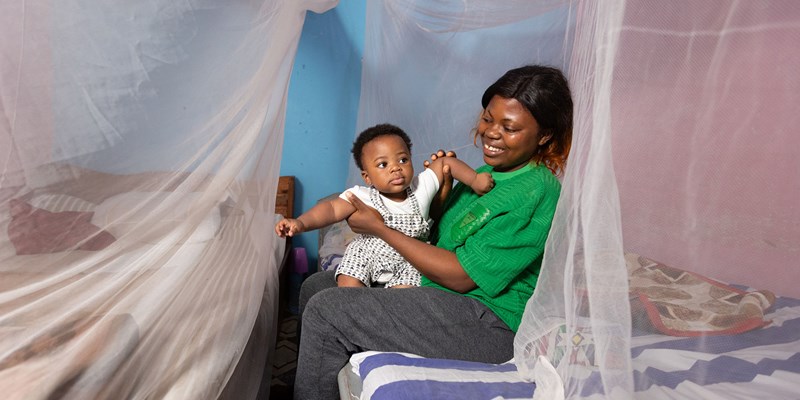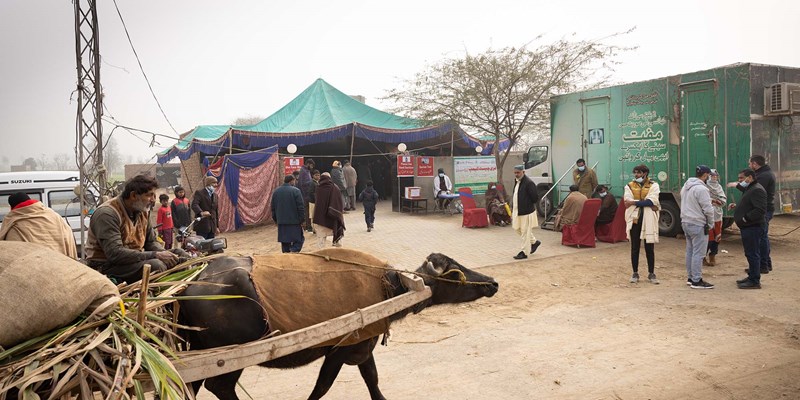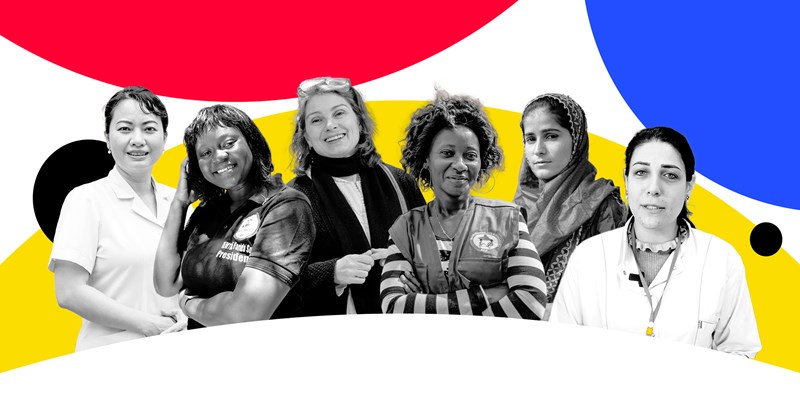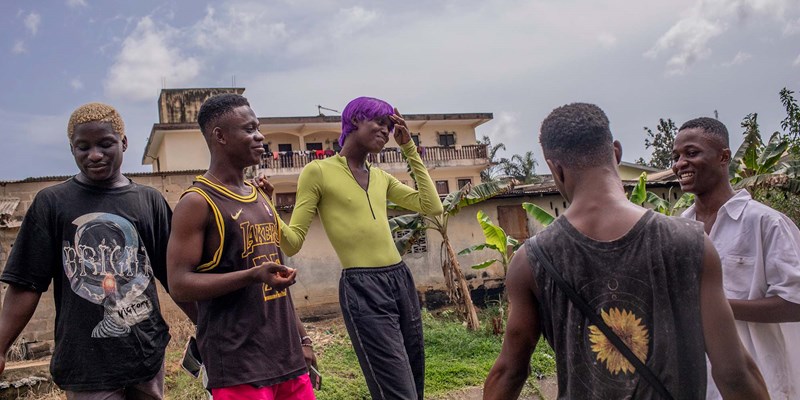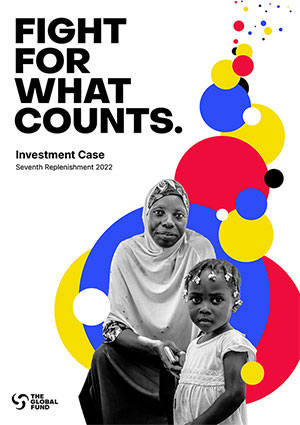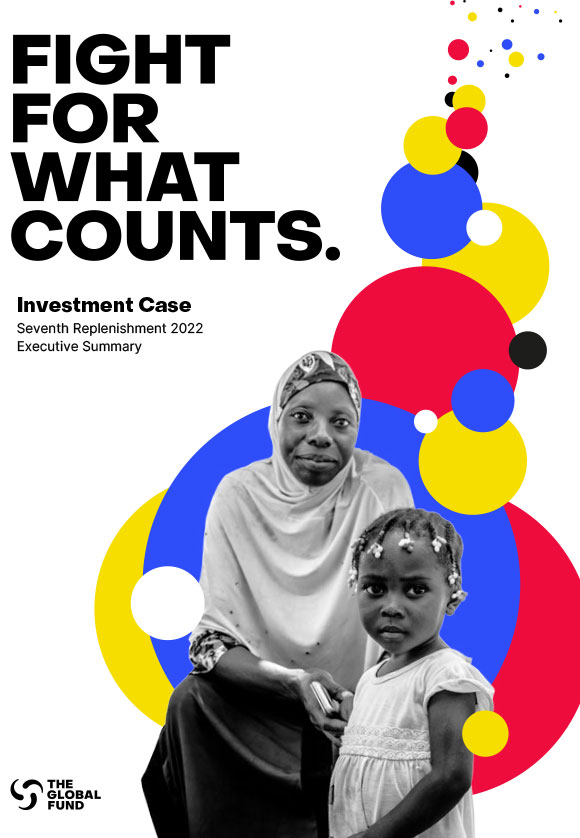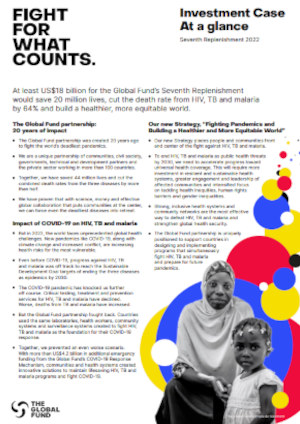

Results Report 2021: Letter from the Executive Director
To mark our 20th anniversary, we had hoped to focus this year’s Results Report on the extraordinary stories of courage and resilience that made possible the progress we have achieved against HIV, TB and malaria over the last two decades, celebrating the countless heroes across the Global Fund partnership who have worked so hard and given so much to beat back the three epidemics. But the 2020 numbers force a different focus. The impact of COVID-19 on the fight against HIV, TB and malaria and the communities we support has been devastating. For the first time in the history of the Global Fund, key programmatic results have gone backwards.
On the cover of this year’s report, there is a photo of a young woman, An Biya Nur Melani, who fought and won a terrifying battle against multidrug-resistant TB(MDR-TB) eight years ago, when she was just 17. An Biya was able to access the medicines to fight the disease, after the Global Fund support for treatment of drug-resistant TB arrived in Indonesia in 2009. She was one of the lucky ones: only 38% of people with drug-resistant TB access care. And even for those who access care, only 57% are successfully treated. The rest do not finish their treatment, or the treatment doesn’t work for them – and they die. An Biya endured 18 months of daily trips to the health clinic for the intensive treatment required to cure her of MDR-TB. But one can’t help but wonder: if An Biya caught MDR-TB today in Indonesia – a country currently facing its biggest wave of COVID-19 to date, with health systems under acute stress and with hundreds of people dying every day from the virus – would she have been tested for MDR-TB? Would she have been able to undergo the intensive and protracted treatment necessary to save her life? Would she have been able to access the support needed to beat drug-resistant TB?
The impact of the COVID-19 pandemic on the fight against TB worldwide has been devastating. Between 2019 and 2020, the number of people treated for drug-resistant TB in the countries where the Global Fund invests dropped by a staggering 19%, with those on treatment for extensively drug-resistant TB registering an even bigger drop of 37%, the number of HIV-positive TB patients on antiretroviral treatment as well as TB treatment dropped by 16%. Overall, around one million fewer people with TB were treated in 2020 compared with 2019.
The impact of COVID-19 on the fight against HIV has also been significant. While it is encouraging that the number of HIV-positive people receiving antiretroviral treatment has continued to increase – by 9% – the declines in prevention services and testing are alarming. Compared with 2019, people reached with HIV prevention programs and services declined by 11% while young people reached with prevention services declined by 12%. Medical male circumcision for HIV prevention declined by 27%. HIV tests taken declined by 22%.
Because of the disruptions resulting from COVID-19, the people at greatest risk of infection have had less access to the information and tools they needed to protect themselves. After so many years of hard- fought gains, it would be a tragedy to see new HIV infections rise again.
Thus far interventions to combat malaria appear to have been less disrupted by COVID-19 than the other two diseases. Other than suspected cases of malaria tested – which fell by 4.3% compared with 2019 – rapid adaptation of malaria services seems to have limited the reverses. However, progress against the disease stalled. We did not see the year-on-year growth in provision of malaria services that we need to beat the disease.
These numbers are stark confirmation of what we feared might happen when COVID-19 struck. In many countries, COVID-19 has overwhelmed health systems, lockdowns have disrupted service provisions, and critical resources have been diverted from the fight against HIV, TB and malaria to fight the new pandemic. COVID-19 has disproportionately impacted the people most affected by existing diseases: the poor, the marginalized, those without access to health care. People avoided going to health centers for treatment out of fear of catching COVID-19 – or of being stigmatized for having COVID-like symptoms such as cough or fever, which could also be treatable malaria or TB.
Yet it would have been even worse without the rapid and determined actions that took place across the Global Fund partnership to mitigate the impact of COVID-19 on the three diseases. In March 2020, the Global Fund immediately made available up to US$500 million through grant flexibilities to support countries in protecting the gains made against HIV, TB and malaria and to respond to COVID-19. On 9 April 2020, we launched the new COVID-19 Response Mechanism, C19RM, to provide further support to countries to respond to the pandemic, mitigate the impact on programs to fight HIV, TB, malaria and urgently reinforce systems for health. By the end of 2020, and thanks to the generous support of a number of donors, US$980 million had been provided to 105 countries and 14 multicountry programs through these two mechanisms. As of August 2021, we had increased this support to US$3.3 billion for 107 countries and 16 multicountry programs. Given our role as the world’s largest multilateral provider of global health grants and our unparalleled experience in fighting infectious diseases, the Global Fund is uniquely positioned to help countries respond to the pandemic. Leveraging our scale, robust systems and longstanding partnerships we could deploy resources quickly and effectively. Drawing on our long experience and relationships, we could move rapidly to support community-led actions to counter COVID-19 and sustain lifesaving HIV, TB and malaria services. Building on many years of investing in crucial health systems infrastructure and capabilities, such as laboratory networks and supply chains, we could help countries deploy these capacities to mitigate both the direct impact of the new virus, and its knock-on impact on HIV, TB and malaria.
From the start of the crisis, we recognized that supporting countries to respond effectively to COVID-19 was vital to protecting our hard-won gains in HIV, TB and malaria. So we have supported their responses to the pandemic by providing tests, treatments and oxygen and by protecting front-line health workers with personal protective equipment (PPE), while also helping them adapt HIV, TB and malaria programs, and urgently reinforce already fragile systems for health. In doing this, the Global Fund worked closely with key partners, not least in creating the Access to COVID-19 Tools (ACT) Accelerator, a groundbreaking global coalition that supports the development and equitable distribution of tests, treatments and vaccines and the strengthening of health systems to fight COVID-19.
The harsh reality is that while these interventions likely prevented an even worse scenario, what we have done was not enough. COVID-19 has been the most significant setback in the fight against HIV, TB and malaria, that we have encountered in the two decades since the Global Fund was established, exacerbating existing inequalities, diverting critical resources, stopping or slowing access to treatment and prevention activities, and putting vulnerable people further at risk.
Throughout this Results Report, we highlight the extraordinary challenges we faced in 2020 as we sought to fight HIV, TB and malaria while responding to a new pandemic. Our partnership demonstrated flexibility and determination, delivering medicine, supplies and care to millions of people around the world despite the disruption, diversion of resources, and dangers of COVID-19. This crisis also showed the critical importance of systems for health in pandemic preparedness and response: laboratories, community health networks, information systems and supply chains built to fight HIV, TB and malaria were suddenly the cornerstone of the fight against COVID-19. COVID-19 has catalyzed a multitude of innovations across all three diseases, such as multimonth dispensing of TB and HIV drugs; using digital tools to monitor TB treatment or enhance prevention interventions; and introducing patient-centered diagnostic approaches, such as co-testing for HIV, TB and COVID-19. Many of these innovations will outlast the crisis and strengthen our fight against HIV, TB and malaria. For example, in Nigeria, the National Agency for the Control of AIDS used the opportunity of people coming to health clinics for COVID-19 to test them for HIV as well, resulting in more HIV-positive people being found. In a number of countries, community health workers and volunteers engaged in the fight against malaria immediately switched from central distributions of mosquito nets – where large groups of people gather in a community square – to delivering the nets door to door. This change in the delivery model resulted in more households getting nets than ever before. For TB, COVID-19 accelerated arguably overdue changes: many countries now deliver multiple months of TB medication and check-ups are done remotely via text or a digital app.
The Results Report shows that despite the headwinds we have faced due to COVID-19, the Global Fund partnership continued to achieve great impact against HIV, TB and malaria overall. We have saved 44 million lives since 2002, including 5.4 million in 2020 alone. Deaths caused by HIV, TB and malaria have dropped by 46% since 2002 in countries where the Global Fund invests. These numbers show why we must continue to invest strongly in the fight against HIV, TB and malaria even as we respond to the new pandemic.
As we mark the 20th anniversary of the creation of the Global Fund, it’s a moment to reflect on the unprecedented global solidarity which gave rise to our partnership. We celebrate the progress achieved in the fight against HIV, TB, and malaria and recommit ourselves to the task of ending these diseases as public health threats around the world.
Our partnership was founded out of the unwillingness to accept the inequalities that made prevention, care and treatment for HIV, TB and malaria available only to the rich. Together with partners, the Global Fund galvanized global solidarity, political leadership and investments against the diseases, which looked unbeatable at the time. As we mark these 20 years of impact, we honor our rich partnership of civil society, faith-based organizations, governments, multilateral and bilateral agencies, nongovernmental organizations, people living with diseases, the private sector and technical agencies. Together, we have changed the trajectory of HIV, TB and malaria. We have changed the story. And we are determined to continue to do so.
To end HIV, TB and malaria and to confront new threats like COVID-19, we must continue to build more resilient and sustainable systems for health. We must strengthen health workforce capacities, support dynamic community responses, build more efficient and effective supply chains and data systems, and secure adequate and sustainable financing. We must renew our commitment to people that have been left behind because of who they are or where they live. We must redouble our efforts to finish the fight against HIV, TB and malaria so that no one is left behind. In the fight against infectious diseases as formidable as these, no one is truly safe until everyone is safe.
Just as 20 years ago, when the Global Fund partnership galvanized the world to fight the world’s leading infectious diseases, it is time for another global push to save lives. We must protect the gains made against HIV, TB and malaria. We must also fight COVID-19 and build strong and resilient systems for health that can protect everyone, everywhere, from future yet-unseen pathogens.
The fight against COVID-19 should be a catalyst to finish the unfinished fights against HIV, TB and malaria. If we can continue to innovate and collaborate – at global, national and local levels – we can end HIV, TB and malaria, beat COVID-19 and build a much stronger foundation for pandemic preparedness and response.
Despite the horrible toll COVID-19 has taken, the pandemic presents us with a chance to build a better, more equitable and healthier world.
